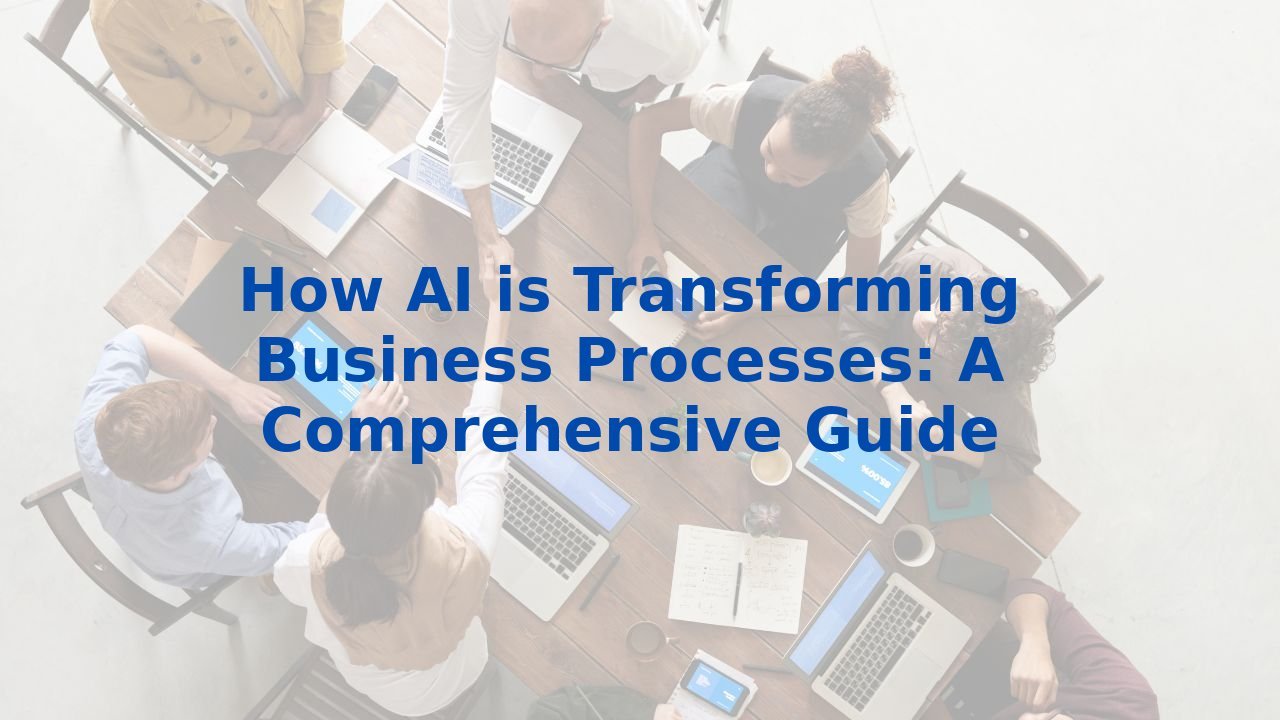How AI Is Transforming Business Processes: A Comprehensive Guide
How AI Is Transforming Business Processes: A Comprehensive Guide
In today's fast-paced business environment, the quest for efficiency is relentless. Organizations are looking for innovative ways to streamline operations, cut costs, and make informed decisions. Enter Artificial Intelligence (AI)—a profound catalyst transforming business processes. This article explores how AI enhances fundamental business operations and underscores the benefits of integrating AI into an organization.
1. Data Analysis and Process Optimization
At the heart of intelligent decision-making lies effective data analysis. AI is revolutionizing how businesses approach this by uncovering previously hidden efficiencies. With powerful algorithms, AI can process extensive datasets at lightning speed, highlight trends, and reveal relationships that may escape human scrutiny. This level of analysis allows organizations to base their strategies on concrete data, improving both tactical and strategic decision-making processes.
2. Process Building and Automation
Creating efficient workflows can often be a complex and time-consuming endeavor. However, AI significantly streamlines this process. Instead of relying solely on manual input, AI can automate mundane, repetitive tasks such as data entry and document processing. This shift empowers employees to focus on higher-level, strategic activities that drive real value. By implementing AI, businesses can unlock creativity and innovation among their team members, transforming the ideals that drive success.
3. HR and Recruitment
The Human Resources sector is benefiting immensely from AI's capabilities. From salary negotiations to talent acquisition, AI provides an objective lens to streamline processes. By analyzing various data points—including performance, budgetary constraints, and market trends—AI aids in creating fair and competitive compensation packages. Furthermore, AI automates labor-intensive tasks within recruitment, identifies potential attrition trends, and personalizes career paths. By leveraging AI, HR teams gain invaluable insights and can devote more time to nurturing employee relationships.
4. Sales and Marketing
AI is reshaping the landscape of sales and marketing, automating outreach, enhancing lead scoring, and personalizing customer interactions. Insights powered by AI provide sales teams with an understanding of which channels yield the best results, which in turn helps prioritize leads and opportunities. In marketing, the predictive capabilities of AI can determine which customers are likely to generate higher revenues, enabling teams to focus their resources where they'll have the most significant impact. When combined with consistent data evaluation, these results can lead to exponential growth.
5. Customer Service
In an age where customer experience is paramount, AI elevates customer service by automating basic inquiries and analyzing feedback. Chatbots, integrated with AI, can efficiently handle routine customer interactions, ensuring timely responses. Furthermore, AI helps in real-time monitoring of customer needs, parsing information, and streamlining ticketing processes for human agents. By ensuring high-quality service and faster problem resolution, AI helps businesses build lasting customer loyalty.
6. Product Development
The product development cycle is another area where AI shines. Generative design, fueled by AI, allows companies to explore countless design variations tailored to specific requirements. This not only saves time but also conserves resources by avoiding the pitfalls of ineffective prototypes. AI's analytical capabilities provide crucial insights into customer preferences, ultimately shaping better-suited products that meet market demands.
7. Continuous Improvement
AI facilitates a culture of continuous improvement. Through ongoing feedback mechanisms and data-driven insights, organizations can iteratively optimize their processes. This evolutionary approach ensures that business process management strategies adapt to industry shifts and maintain alignment with organizational goals.
The Benefits of Training Employees for AI
While AI can be a game-changer, its true potential is unlocked when employees are equipped to leverage its capabilities. Training employees in AI can offer substantial benefits, including:
- Enhancing Understanding: Employees who grasp how AI operates can better utilize its insights, leading to improved decision-making.
- Operational Expertise: Proper training enables employees to operate AI tools effectively, lessening the burden of manual effort and reducing error rates.
- Informed Decision-Making: Employees trained in AI can interpret data contextually, making more informed choices that contribute to organizational success.
- Adaptability: When processes evolve alongside technology, trained employees can seamlessly adjust and continue to add value.
Conclusion
AI is not just a buzzword but a transformative force across various business processes. From data analysis to customer experience and product development, AI is paving the way for more efficient, data-driven decision-making. To harness its full potential, organizations must also focus on training employees, ensuring they are prepared to embrace this technological evolution. By cultivating a culture of learning and leveraging AI, businesses can position themselves for sustained growth and a competitive edge in today's dynamic landscape.
To explore comprehensive AI training solutions for your organization and elevate your team’s expertise, consider visiting Complete AI Training for a wealth of resources tailored to various business needs.



